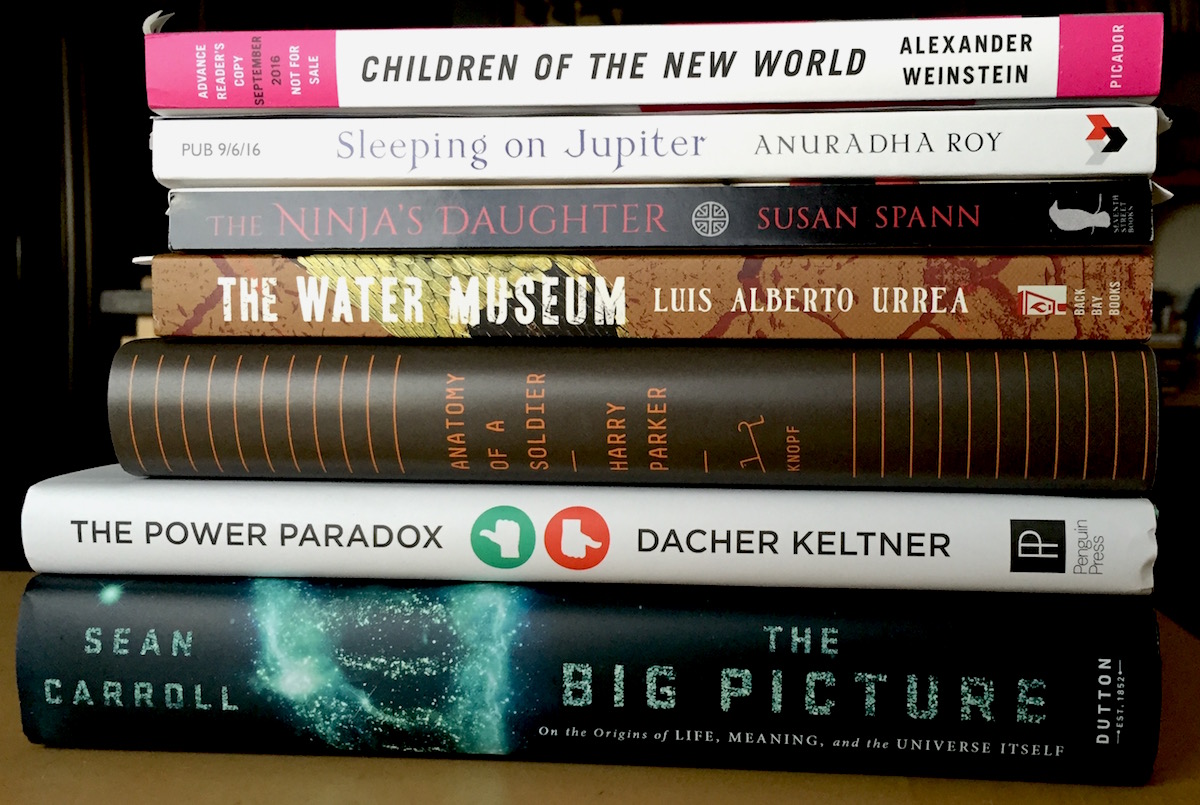The Familiar
I’ve memorized the dark of my room now,
the path between the door and the bed posts
that lash out and mark my pale shins,
memorized the width of the rivulet I make
between our two sleep bodies by rolling
just slightly away.
He told me his kink was “morning sex.”
Indeed, I feel extra naughty
at approximately 6:36 a.m.,
get off on licking the sleep
from your eyes. I reach my peak
when over pancakes I get a glimpse of the deflated
anniversary balloon in the diner shellacked
to the curtains and hanging sad.
In my dream last night I lived with my parents
and we were skipping town. Their faces a
mishmash blur, they told me I’d have my own
room; a window seat, a walk-in closet.
We arrived in the evening. My dream self
paced through the room, which became a set of
stairs, which became a zigzagging blue
slide into a dirt hole. No the slide is
a yellow water slide in Texas and cherry blood
spills from my toe. No my toe is my future
child’s toe that I bandage. No my child
is a portable first-aid kit no my child
is a pixelated projection on a weird white wall
no I will not just spend my life as
the tender of this tin of bandaids!
You shouldn’t end anything
with your character waking from a dream.
But I can’t get out of this room
without at least one eye cracked.

The rumors are true: we at the Seattle Review of Books are incredibly excited to be presenting a show at Bumbershoot this year! When Bumbershoot asked us to program an hour on their Words and Ideas stage, we decided to ask three Seattle-area poets known for their awesome performance skills to share a stage for the first time ever. Happily, all three said yes.
EJ Koh wowed us at last year's Lit Crawl with her clarity, stage presence, and incisive poems. She's also published a poem called "Korean War" on our Tuesday poetry chain.
Robert Lashley is one of the most compelling performers we've ever seen. When he reads, every atom in the room stands still; his fiery delivery and his passionate poems — if you haven't yet read his collection The Homeboy Songs, you should amend that mistake right now — are unforgettable.
And Sherman Alexie is, plainly and unhyperbolically, the single best reader in the Pacific Northwest. He's riotously funny and brilliant and he brings his poems to life with a singular energy. Alexie has been reading in Seattle for decades now, and he still commands rooms with his inviting humor and cutting observations. With on-the-rise talents like Koh and Lashley on the bill, Alexie was clearly the only worthy headliner; we're so grateful that he agreed to take part in this show.
This is going to be a memorable one, folks. What happens when you put three show-stoppers on a single bill? Damned if I know, but I sure am excited to find out. Bumbershoot is happening on Friday, Saturday, and Sunday, September 2nd, 3rd, and 4th. Tickets go on sale Friday at 10 am. We'll see you there.
By the way some people write around here, you'd think that only one person wrote around here. I also did a blurb about where I write, for Hugo House. I kept it short, but I did a much more in-depth look at my studio when I ran my Kickstarter last year.
In my studio, I write fiction, I work on the Seattle Review of Books, and I ship copies of my novel California Four O'Clock.
Where do you write? Just remember to tag it: #WhereWeWrite.
The Hugo House is doing a neat series right now called #WhereWeWrite, in which writers show off the places where they do their writing. Over the weekend, I contributed a post about the hammock where I do a lot of my writing. If you want to discuss your writing process, please share a photo and the hashtag #WhereWeWrite on Twitter, Facebook, Instagram, or Upsiedaisy, which is a social networking site that I just now made up but which will probably be real by the end of the day.
Everybody's idea of fun
Sponsor Floating Bridge Press is back to present 2015 Chapbook Award finalist Brian Cooney, and his book My Idea of Fun. As always, Floating Bridge's Chapbook Award brings out the best in local poetry, and in Cooney they found a poet who is direct, funny, and connected to pop culture in an expressive way.
Like always, you don't need to take our word for it. We have two poems on the Sponsor's page for you to read. If you like it, make sure to click through and find out more on Floating Bridge Press's website.
We have only four sponsor slots left, before August. If you're a small publisher, writer, poet, or foundation that is looking to back our work, and advertise your own in an inexpensive and expressive way, take a look at our open dates. We'd love to talk to you about opportunities to sponsor us. It's our way of making internet advertising something to look forward to.
Lunch Date: All the Birds in the Sky
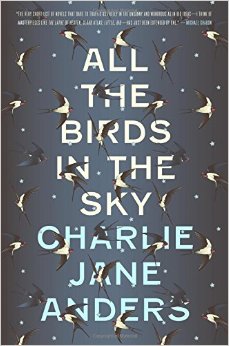
(Once in a while, I take a new book with me to lunch and give it a half an hour or so to grab my attention. Lunch Date is my judgment on that speed-dating experience.)
Who’s your date today? All the Birds in the Sky, the bestselling novel written by i09 editor-in-chief Charlie Jane Anders.
Where’d you go? The Sunlight Café in Roosevelt.
What’d you eat? I had the large portion of the blueberry yogurt hotcakes ($9.50).
How was the food? I’m a big fan of the Sunlight Café. They’re a vegetarian joint — they claim to be the longest-running vegetarian restaurant in Seattle — and they always put together a great breakfast, even if you’re eating breakfast for lunch. The hotcakes were large and moist and sweet and filling; they were about everything you'd want in a pancake platter. The only bad thing about my meal? I noticed a note on my table that says the Sunlight Café is going to be moving due to development in the area. This is sad news: Roosevelt is getting a light rail station, so development is naturally going to happen, but I hope the Sunlight Café can be a part of that expansion. It’s such a neighborhood institution, and such a reliably good restaurant, that it would be a shame for Roosevelt to lose its neighbor of forty years.
What does your date say about itself? From the publisher’s promotional copy:
Childhood friends Patricia Delfine and Laurence Armstead didn't expect to see each other again, after parting ways under mysterious circumstances during middle school. After all, the development of magical powers and the invention of a two-second time machine could hardly fail to alarm one's peers and families.
But now they're both adults, living in the hipster mecca San Francisco, and the planet is falling apart around them. Laurence is an engineering genius who's working with a group that aims to avert catastrophic breakdown through technological intervention. Patricia is a graduate of Eltisley Maze, the hidden academy for the world's magically gifted, and works with a small band of other magicians to secretly repair the world's every-growing ailments. Little do they realize that something bigger than either of them, something begun years ago in their youth, is determined to bring them together--to either save the world, or plunge it into a new dark ages.
A deeply magical, darkly funny examination of life, love, and the apocalypse.
Is there a representative quote? “He looked at the cover of the paperback, which had a painting of a lumpy spaceship and a naked woman with eyes for breasts. He didn’t start to cry or anything, but he kind of wanted to. The paperback cover said: ‘THEY WENT TO ENDS OF THE UNIVERSE — TO STOP A GALACTIC DISASTER!’”
Will you two end up in bed together? Yes! I’ve always been fascinated by the imaginary wall between fantasy and science fiction, how books are either entirely one or entirely the other. What Anders is doing is stuffing the protagonist of a fantasy novel — an intriguing young woman who can talk to birds — and the protagonist of a sci-fi novel — a young man with a watch that allows him to travel a matter of seconds into the future — into the same book, to see what happens. It’s such a simple premise, but it really grabbed my attention. In addition to the three enormous pancakes that were bigger than my face, I plowed through sixty pages of this book, so I imagine I'll be racing to the finish in no time.
The patron poets of Open Books
Sometimes when I’m feeling saucy, I’ll ask a bookstore owner to choose a book or two to represent their store. It’s a hard question to answer: how is it possible to reflect the character, staffing, and stock of an entire bookstore with a single book? It’s a question that has broken some booksellers; they shrug, or name a dozen books, or promise to get back to me and never do.
Perhaps when she takes over the store in August, new Open Books owner Billie Swift will have a different answer at the ready. Outgoing Open Books owner John Marshall, though, comes up with an answer almost immediately. He has three choices: Robert Sund’s Poems from Ish River County and Tacoma poet Laura Jensen’s books Memory and Shelter. Marshall never met Sund, but he says that “when people ask me for a poet who captures the Northwest,” his mind always turns first to Sund.

Sund, who passed away in 2001, was a poet, painter, translator and calligrapher. Ish River collects a large amount of his work into a single volume. Sund’s poems are short and very interested in the natural world, though he doesn’t fall into the traditional sense of naturalism: he’s not celebrating nature as an other, he’s observing it as a participant. Sund’s reflections on nature and his observations of people come from the same place: it’s a very Northwest-y approach to nature, a more holistic, modern understanding of humanity’s place in the universe.
“It’s surprising how many/people are laughing, once you get away/from universities/and stop reading newspapers,” Sund writes in a series of poems chronicling the life and work that centers around a grain elevator in eastern Washington. He’s pointedly not an academic; Sund is interested in work, and what work does to the world and to bodies. A student of Theodore Roethke, Sund’s writing continues a long Northwest tradition of labor writing.
The transitory nature of time figures into his work, too. “In America, history goes by quickly./Like a windstorm,” he writes in “My Father.” Later in Ish River he writes, “In the world of men/centuries go by leaving/little trace.” The things that will last are the rivers and the plants and the sun, he understands, but the sand-castle temporariness of present day doesn’t separate Sund from the people. Instead, it makes him want to celebrate the present even more. His poem “The Rest of the Way” makes plain this obligation to enjoy and capture the moment:
Our fathers
carried us
a long way into the world,
They leave us one day, and die.
And we carry them
the rest of the way.
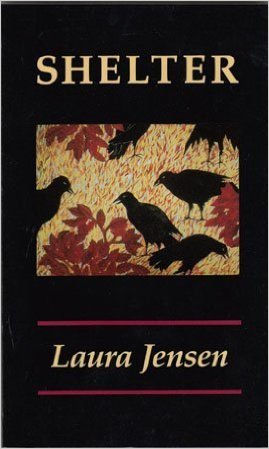
Jensen still publishes work occasionally, but Memory and Shelter are important to Open Books, Marshall says, because they were originally published by “a press in Port Townsend called Dragon Gate.” As poetry presses sometimes do, Dragon Gate went out of business, and their copies of Memory and Shelter were going to be pulped, “so we bought every copy,” Marshall says. “I am quite relieved to own them and sell them at a reasonable price.” In fact, Open Books still sells them at cover price: Memory, which was published in 1982, sells for $5, and Shelter, which was published in 1987, is $7.
Jensen’s poems are not so specifically interested in the Northwest as Sund’s poems are, but they are very much of the Northwest. One poem imagines the Goodyear Blimp going AWOL. She stops mid-poem at one point to wonder what Anne Sexton is up to. She reflects on being terrified of The Creature from the Black Lagoon as a child, and how even now
I cannot turn from creaks
in the floor,
from cracks
in the table.
I keep my eyes open and have to see
if something is terribly wrong here.
Her poems are distinctly interested in seeking out the “terribly wrong.” Marshall calls Jensen’s poetry “delightfully strange.” She reflects on a beachside promenade in Oregon, imagining the waves of humanity coming and going—the youth charging forward into the water, the elderly standing back and watching the waves.
Jensen is not a Northwest poet in the same way that Sund is a Northwest poet. Jensen is more socially Northwest; her response to the world — that sense of being apart from humanity, even as you acknowledge your place in the throngs on the sidewalk — is very Northwestern. Sometimes, she is chilly and distant. Other times, she’s awkwardly close, her breath on your skin. But wherever she stands — be it inside your comfort zone or across the street, judging you harshly with a glare — Jensen is always saying something of interest.
You could put these two poets in a line — Sund on one end by the moss-covered tree trunks, Jensen on the other end, over by the sidewalk café where people sit out in the light rain pretending not to be bothered — and in between them, you could fit every Northwestern poet who writes or ever wrote or ever will write. In that way, they are the twin perfect patron saints of Open Books. They represent us all.
We reported at the beginning of this month that Open Books owner John Marshall was in the "closing stages" of selling his poetry bookshop to a new owner. The closing stages have finally closed, and in an email to customers last night, Marshall finally revealed the new owner's name:
We are exceedingly happy to announce that the next owner of Open Books: A Poem Emporium will be Billie Swift. She has been an avid customer for years, has a sharp and inquiring mind, and is a truly engaging soul. We cannot imagine a better person to be entrusted with the future of Open Books. The actual change in ownership will take place at the end of August, but Ms. Swift will be a fixture in and around the store from now until then. Of course, we'll have a celebratory ceremony/party near the date of transfer, and we'll count on your presence then, either in body or spirit. Between now and then, you'll have ample opportunity to see us all (including on occasion Christine, who does the bookkeeping and pops in now and then). Please know that the store you love is still here and will go on, with your continued care and support. The amazing journey continues!
We're arranging an interview with Swift now, and we'll bring it to you soon. So many questions remain — what will she change about the store, what will stay the same — but for the moment, literary Seattle should take a breath and relax; one of a handful of poetry-only bookshops in America will continue under new ownership. This is exciting news!
The Sunday Post for April 24, 2016
The Real Story of How Amazon Built the Echo
A long piece by Joshua Brustein in Bloomberg about how the Echo came to be, and how it came to be a hit, despite pundits prognosticating sure failure.
When it launched, Amazon’s critics jumped to mock the company. Some called it a useless gimmick; others pointed to it as evidence of Amazon’s Orwellian tendencies. Then something weird happened: People decided they loved it. Amazon never releases data about how its products are selling, but Consumer Intelligence Research Partners issued a report this month saying that Amazon had sold more than 3 million devices, with 1 million of those sales happening during the 2015 holiday season. About 35,000 people have reviewed the speaker on Amazon.com, with an average rating of 4.5 stars out of 5.
Nude Bookplates: Should They Exist?
Thank you Dan Piepenbring, for bringing us the serious issues of yesterday.
It’s time. I must bring to your attention the least essential controversy of 114 years ago: nude bookplates.
Digital Couture Is Actually a Thing
Virginia Postrel takes us inside how modern designers are using computers and 3-D printing to change fashion.
For designers willing to work closely with technologists, however, digitally driven production techniques are enabling new aesthetic and functional forms. Unlike wearables, which incorporate computing into garments and accessories, here the fashion, not the technology, is the focus.
Rosarium Publishing: The Next Level - Kickstarter Fund Project #16
Every week, the Seattle Review of Books backs a Kickstarter, and writes up why we picked that particular project. Read more about the project here. Suggest a project by writing to kickstarter at this domain, or by using our contact form.
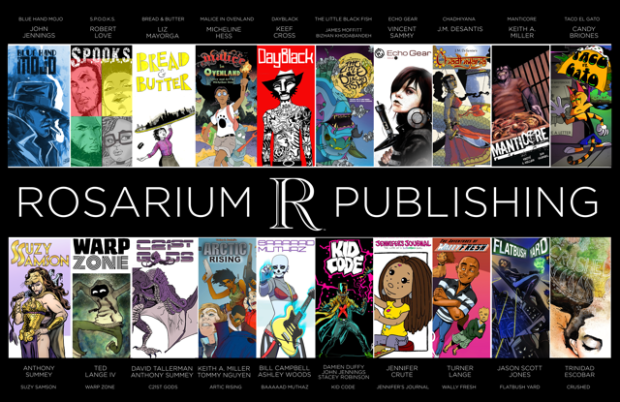
What's the project this week?
Rosarium Publishing: The Next Level. We've put $20 in as a non-reward backer
Who is the Creator?
What do they have to say about the project?
Publisher of diverse books and comics. Help us expand so we can deliver more of what you love.
What caught your eye?
We're well aware of Rosarium, at the Seattle Review of Books. Their anthology about Samuel R. Delaney Stories for Chip was co-edited by Seattle writer Nisi Shawl, and included work by local SF writers Eileen Gunn and L. Timmel DuChamp. The great anthology Mothership: Tales from Afrofuturism and Beyond was co-edited by Edward Austin Hall, who you may remember around these parts from his review of Matt Ruff's Lovecraft Country.
The work this publisher puts out is so impressive. It's incredibly diverse, both in the sense of representation, but also in the sense that they publish novels and comics, steampunk to science fiction. The berth of their spaceship is huge, and the quality of the work is wonderful.
Why should I back it?
To see more from publishers like Rosarium. Like many presses, they were started in the spare time of their founders, in this case, Bill Campbell. He started the press on a shoestring, and now has many titles in print. But still, it's a part time gig supported by his day job.
This fundraiser — on IndieGoGo this week, not Kickstarter — would allow them some capital to start printing offset, instead of on-demand, and if they raise enough they'll be able to hire a publicist to help with getting the word out about future releases.
How's the project doing?
They need our help! They're less than $12k to their $40k goal, and time is running low — twelve days! Time to raise the alarm and circle the wagons. This is a great project to put a few ducats in, and the rewards are great books.
Do they have a video?
Kickstarter Fund Stats
- Projects backed: 16
- Funds pledged: $320
- Funds collected: $240
- Unsuccessful pledges: 0
- Fund balance: $720
My picks for Seattle Arts and Lectures' 2016-17 season
Last night, Seattle Arts and Lectures unveiled some of the authors they’re bringing to town for their 2016-17 season. You can see the full announced slate on SAL’s site and buy tickets for most of the authors right now. It’s a big, splashy, ambitious list; all the authors are worth your consideration, but I’d like to highlight a few personal favorites that you might consider checking out when they come to town.
SAL’s Poetry Series is staying at the Nesholm Family Lecture Hall at McCaw Hall next year, which is an intimate venue that sells out pretty easily. The poet I’m most excited about in next year’s series is the legendary Alice Notley. At a SAL event a couple years ago, Dorothea Lasky read a short untitled Notley poem that I loved so much I printed it out and tacked it right in front of my writing desk, where my eyes always land when I pause in the middle of writing. It’s the kind of poem that burns itself into your memory with its rawness. You can listen to Notley read that poem right here; it will only take fifteen seconds of your life.
Another poet in the Poetry Series who I adore is Ross Gay, who writes haunting, sometimes heartbreaking poems. I especially love this passage from “For Some Slight I Can’t Quite Recall,” a reminiscence from Gay’s early teens:
Meanwhile, SAL’s Literary Series is making a huge, possibly risky move: it’s heading back to Benaroya Hall. Not too many years ago, SAL had to move the Literary Series from Benaroya to the much-smaller Town Hall because the organization was suffering from sinking audience attendance and a lack of creative leadership. Now that Town Hall is closing for renovations, and now that SAL is enjoying a creative renaissance—their curatorial artistry is better than its ever been, and the organization has been resuscitated from top to bottom, thanks in large part to Executive Director Ruth Dickey and Associate Director Rebecca Hoogs—they’re taking a shot at the big tent again.I leaned the boy’s head
full force into the rattly pane of glass
on the school bus and did so with the eagle of justice
screaming in my ear as he always does
for the irate and stupid
Two of the Literary Series authors are guaranteed blockbusters: journalist and historian Timothy Egan is one of Seattle’s very best writers, and he actually doesn’t make that many appearances in town, so this event is surely special enough to pack the hall. And Ann Patchett is so roundly beloved — she demonstrates that rare blend of critical success and instant-bestseller status — that the only question is how many times the sold-out crowd will offer her a standing ovation.
But I want to call your attention to two smaller names on the Literary Series marquee. Ben Fountain has only written one novel, but it is an absolute doozy of a book. Billy Lynn’s Halftime Walk knocked me off my feet when I reviewed it a few years ago. It’s one of those novels that leaves you reeling with the way its portrait of contemporary America changes the world around you. (It’s also being adapted into a film by Ang Lee, which is either a blessing or a curse, depending on how you feel about adaptations.)
And British novelist Helen Oyeyemi is a literary voice on the rise. Her novel Boy, Snow, Bird blew me away with its reappraisal of the wicked stepmother trope, and she’s earning the kind of glowing critical praise for her books that indicates she’s got a long career ahead of her. If I had to choose one SAL reader out of this season as the kind of event you’ll be reminiscing over for years to come, it would be hers.
The Help Desk: Are we pro or con when it comes to sexy librarian porn?
Every Friday, Cienna Madrid offers solutions to life’s most vexing literary problems. Do you need a book recommendation to send your worst cousin on her birthday? Is it okay to read erotica on public transit? Cienna can help. Send your questions to advice@seattlereviewofbooks.com.
Dear Cienna,
Do you have any opinions on sexy-librarian porn? I'm kind of flattered by the trope, but I also wonder if maybe it doesn't raise expectations to an uncomfortable level with my prospective girlfriends.
Annie, Admiral
Dear Annie,
I'm glad you asked! I have stronger opinions on porn than all the right hands in Gary Herbert's public health department combined. Generally, I'm pretty positive about the sexy librarian trope, and here's why: People who objectify librarians find their brains as sexy as (if not more so than) their physical appearance. Librarians are intellectuals. Gatekeepers of knowledge. Curators of imagination. Smart people pant over stuff like that. They swoon. And isn't that a refreshing change in porn?
Of course, if prospective girlfriends are making you uncomfortable with their objectification – if they demand you collect late fees while wearing a ball gag or read them Goodnight Moon while sitting on their face (and you're not into it), I suppose that's problematic. Maybe you should remind them that you're not just a sexy brain stuffed inside a sexy body with the entirety of modern thought harnessed at your fingertips, you're a real person with nonbookish interests who sometimes wants to sit in sweatpants, eat Muddy Buddies and watch Real Housewives punch each other in the Fake Tit.
Kisses!
Cienna
Book News Roundup: Welcome to Seattle, Simon Hanselmann!
Have you read Kelton Sears's profile of new-to-Seattle cartoonist Simon Hanselmann yet? You really should. It's a super-interesting introduction to a great (and newly local) talent. Hanselmann is signing his new Fantagraphics title Megg & Mogg In Amsterdam and Other Stories at the Fantagraphics Bookstore and Gallery tomorrow; you should obviously go.
Have you also read about the time Prince donated $12,000 to a library in Louisville because it "was the first full-service free public library in the nation open to African-Americans?" If not, please do so.
You have eight more days to contribute to the Ghosts of Seattle Past project. If you're sad about the passing of any local landmarks, you should write them up for this project; your work might wind up in a collected edition published by Chin Music Press, the local publisher of beautiful books.
New York City just approved a $30,000,000 contract with Amazon to provide e-books for the public schools.
Beloved Vertigo Comics editor Shelly Bond was fired by DC Comics this week. Jude Terror at The Outhousers connects this news to the longstanding gossip that one editor at DC Comics has such a terrible record of sexual harassment charges that he's been moved into what comics journalist Nick Hanover described as "an all male quarantine." Comics rumor site Bleeding Cool identified the DC staffer in question as Superman editor Eddie Berganza
"On the one hand the percentage of adults, overall, who say they haven’t read a book in the last year has climbed noticeably since 1978. On the other hand, the youngest demographic surveyed, ages 16-17, were the most likely to have read a book in the past 12 months."
Libby Coleman profiles new World Slam Poetry champion Emi Mahmoud at OZY.
Her poetry shifts the focus back on Darfur. What sets Mahmoud apart, according to Renee, is a “global lens. Slam can be very U.S.-centric.” Mahmoud tries to start conversations. Some of her talking points are anecdotal — she has returned to Sudan a number of times, the longest visit for six months — and some of her stories have been drawn from refugee family members. Still other insights stem from her academic work: She’s double majoring in anthropology and molecular biology and is currently studying the trauma experienced by Darfuri refugee women in the diaspora. Her hope is to combine raising awareness through performance with a concrete plan to rebuild infrastructure in Darfur.
- Just for your information: "Kill Thurber," a comic by Matthew Thurber published yesterday in the Paris Review, is pretty goddamn delightful if you're a fan of the New Yorker, time travel stories, or time travel stories involving the New Yorker.
Portrait Gallery: Nancy Rawles
Each week, Christine Marie Larsen creates a portrait of a new author for us. Have any favorites you’d love to see immortalized? Let us know
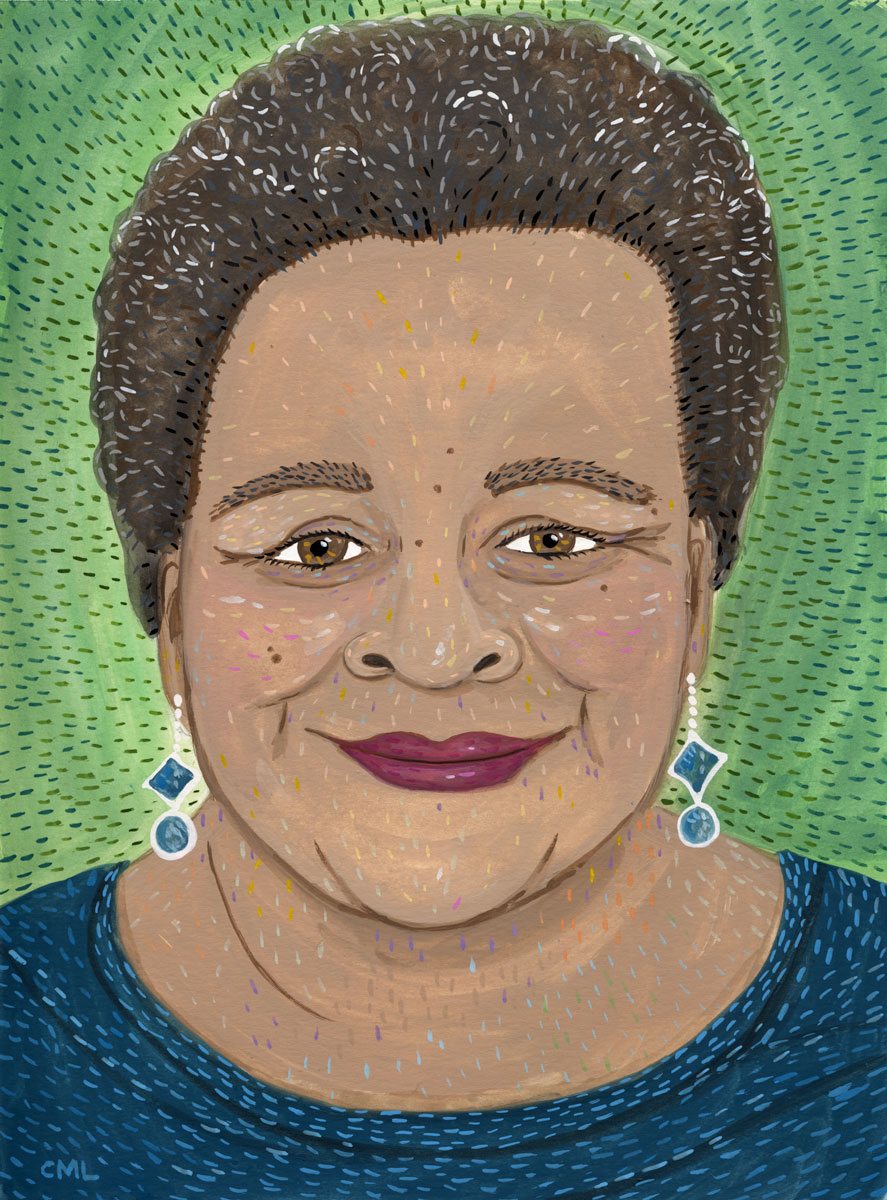
Nancy Rawles is appearing Sunday at the Columbia Branch of the Seattle Public Library to run a writing workshop on how to write dialog. Don't miss it!
Open faced
Published April 21, 2016, at 11:43am
The Face is a new series of books in which authors write about their own faces. Does that premise make you feel a little uncomfortable? Good; that's the point.
Prince has died. Long live Prince.
Pop music superstar Prince has died at age 57 at his suburban Minneapolis estate, publicist says - AP, TMZ https://t.co/utQK8CSrUJ
— Breaking News (@BreakingNews) April 21, 2016
I wanted to be a musician so bad. We'd gather at my friend Randy's house, all of us fifteen or so. We'd order pizza in, and we'd watch Purple Rain on VHS. Maybe a dozen times, we played it. We talked about our band and how cool it was going to be. We talked about Prince, and how great a guitar player and musician he was. He made us feel superhuman.
We have a policy here, on the Seattle Review of Books, when big news breaks. We review our posts for the day. Should we halt them, out of respect? Are any of them inappropriate for the tone of the day?
But on the day that Prince dies, what is appropriate? There are no maps for this. Like Bowie, gender was Prince's playground. But although Bowie's death was a surprise to us, it was not to him, he played us off. Prince feels wrong. We've been robbed. He was robbed. Maybe some sites will try to find a literary angle to cover here. Maybe they'll point to his greatest biography or something. But sometimes, all you have to do is acknowledge.
Watching Purple Rain was transformative. It taught me about making things, because Prince made things. Prince made music. He made movies. He was a gearhead, and a music nerd. He was a scientist and a musical prodigy. He made people dance, and fall in love. He expressed the truest human emotions in the most poignant ways. He was — not by blood or fiat but by earning every bit of it — true American royalty. He never stopped. He never gave up. He always was creating. He worked, and worked, and worked.
Thank you for everything, Prince. Anil Dash should have the last word here (and it's worth clicking through to read his whole thread of thoughts on Prince's death):
Goodbye, Prince. I am so thankful for all you made, and all you did, and the example and inspiration you’ve been for me. I love you.
— ଅନୀଲ (@anildash) April 21, 2016
Thursday Comics Hangover: Mini comics, big love
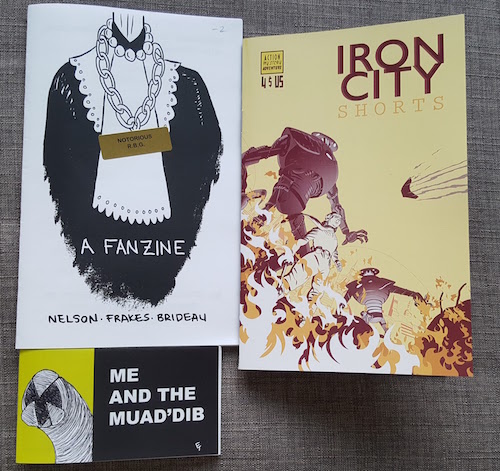
It was kind of a boring new comics Wednesday from the mainstream publishers, so I decided to dive into the minicomics section of Phoenix Comics & Games to see what local cartoonists are working on. Or, in one case, what local cartoonists were working on; I had never seen the 2014 Justice Ruth Bader Ginsburg fanzine Notorious R.B.G. before, so it was new to me. (It also predated the 2015 Christmas bestseller Notorious R.B.G. by a year.)
The zine from poet Amber Nelson, cartoonist Colleen Frakes (author of Prison Island) and cartoonist Neil Brideau, which is “Dedicated to Ruth Bader Ginsburg with apologies to Beyonce,” is a collection of song lyrics rewritten from Ginsburg’s perspective. (“My mother told me two things;/to be a lady and to be independent.”) As a tribute to Ginsburg, and to the other women on the Supreme Court, it’s a delight, and at two bucks, it’s a steal. My favorite bit is the two-page comic-strip cover of “Flawless” that caps the book. (“Woke up like this/Flawless/Supreme Court steps/Flawless…”)
Joseph Laney’s Iron City Shorts is a $4 minicomic collecting two short stories set in and around the fictional Iron City. The setting is a kind of retro-sci-fi groove, with giant robots and goggles and dirigibles. The first story, “The Big Knockover,” feels a bit slight, but the second story, “Escape the Past,” more than makes up for the first in terms of storytelling strength. “Escape” begins with a prison break (from, as a caption helpfully informs us, “Gargantua Island Prison: one of City Harbor’s most notorious landmarks”) and continues with a twisty tale of revenge that incorporates several moral shades of gray. Laney’s sense of design is excellent. He packs a lot onto every page, and his chunky cartooning style — which kind of reminds me of a sci-fi Dean Haspiel — serves the subject matter very well. He’s obviously put a lot of thought into Iron City as a setting and a theme, and hopefully this sampler will function as a springboard for more adventures soon.
Finally, Eli Tripoli’s Me and the Muad’dib is a demented mashup that somehow makes perfect sense: it’s a Chick tract-style evangelical pamphlet extoling the mythology of Frank Herbert’s Dune series. While Tripoli’s art is primitive, the glorified stick figures ably serve the narrative — a pair of supporters of Paul Atreides try to convince a skeptic to believe in the Emperor of Dune. The language is spot on for a Chick tract parody: “Paul Atreides isn’t a giant fish, he’s the Kwisatz Haderach! He’s a person like you or me. And he was born here on Calderan, just like us!” As a celebration of Herbert’s super-weird mythology, it’s glorious — a respectful work of fandom that’s clearly born from a deep and abiding love. Come to think of it, that describes all three of these books.
Who would have thought? More people use public libraries when public libraries get more revenue. Maybe Seattle Public Library leadership should focus more on investment in the collection and less on pursuing an "anti-book" agenda?
We told you about this a couple weeks ago, and thankfully sanity has prevailed:
The Tennessee House of Representatives failed Wednesday to override Gov. Bill Haslam’s veto of a bill to make the Bible the official state book.
Haslam, a Republican, vetoed the Bible bill last week, saying he felt the bill “trivializes the Bible.”
